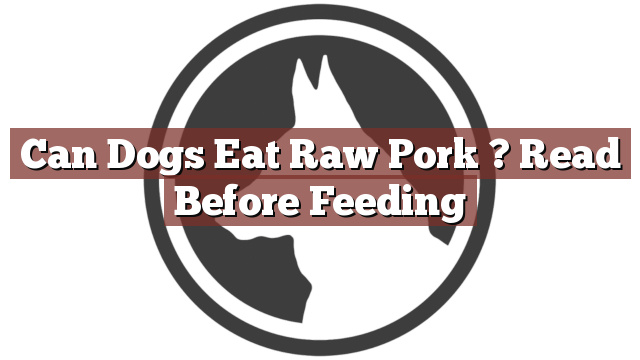Understanding Your Dog’s Dietary Needs
As a responsible pet owner, it is crucial to understand your dog’s dietary needs. Providing a balanced and nutritious diet is essential for their overall health and well-being. While dogs are primarily carnivorous animals, their diet should still consist of a variety of proteins, fats, carbohydrates, vitamins, and minerals. It is important to note that not all foods suitable for humans are safe for dogs to consume. Therefore, it is vital to research and educate yourself about what foods are safe and appropriate for your furry friend.
Can Dogs Eat Raw Pork? Read Before Feeding
Can dogs eat raw pork? This is a common question among dog owners considering adding pork to their pet’s diet. The answer is no. Raw pork, whether it be pork chops, bacon, or sausage, should never be fed to dogs. Raw pork can contain harmful bacteria such as Salmonella or Trichinella, which can lead to severe health issues for your dog. These bacteria can cause various symptoms, including vomiting, diarrhea, and even life-threatening conditions.
Cooking pork thoroughly is essential to eliminate any potential bacteria and parasites, making it safe for human consumption. However, even cooked pork should be given to dogs in moderation. High-fat content in pork can lead to gastrointestinal issues, such as pancreatitis, which can be painful and dangerous for your canine companion.
Pros and Cons of Feeding Raw Pork to Your Dog
Feeding raw pork to your dog has both pros and cons that should be carefully considered. On one hand, raw feeding enthusiasts argue that a diet consisting of raw meat can be beneficial for dogs. They believe that it can improve their coat, promote healthier teeth and gums, and even boost their immune system. However, it is important to note that these claims are not backed by scientific evidence.
On the other hand, there are significant risks associated with feeding raw pork to dogs. As mentioned earlier, raw pork can be contaminated with harmful bacteria and parasites, posing a serious health risk to your pet. Additionally, the high-fat content in pork can lead to obesity and other related health issues if not properly controlled. Therefore, it is recommended to consult with a veterinarian before making any decisions regarding your dog’s diet.
Conclusion: Considerations and Recommendations
In conclusion, it is best to avoid feeding your dog raw pork due to the potential risks it poses. Raw pork can contain harmful bacteria and parasites that can cause severe health issues for your furry friend. Instead, opt for cooked pork in moderation. Ensure that it is thoroughly cooked to eliminate any potential bacteria and remove excess fat. It is always advisable to consult with your veterinarian to determine the most appropriate and balanced diet for your dog based on their specific needs and health condition. Your veterinarian can provide personalized recommendations and guidance to ensure your dog’s optimal health and well-being.
Thank you for taking the time to read through our exploration of [page_title]. As every dog lover knows, our furry friends have unique dietary needs and responses, often varying from one canine to another. This is why it's paramount to approach any changes in their diet with caution and knowledge.
Before introducing any new treats or making alterations to your dog's diet based on our insights, it's crucial to consult with a veterinarian about [page_title]. Their expertise ensures that the choices you make are well-suited to your particular pet's health and well-being.
Even seemingly harmless foods can sometimes lead to allergic reactions or digestive issues, which is why monitoring your dog after introducing any new food item is essential.
The content provided here on [page_title] is crafted with care, thorough research, and a genuine love for dogs. Nevertheless, it serves as a general guideline and should not be considered a substitute for professional veterinary advice.
Always prioritize the expert insights of your veterinarian, and remember that the health and happiness of your furry companion come first.
May your journey with your pet continue to be filled with joy, love, and safe culinary adventures. Happy reading, and even happier snacking for your canine friend!

